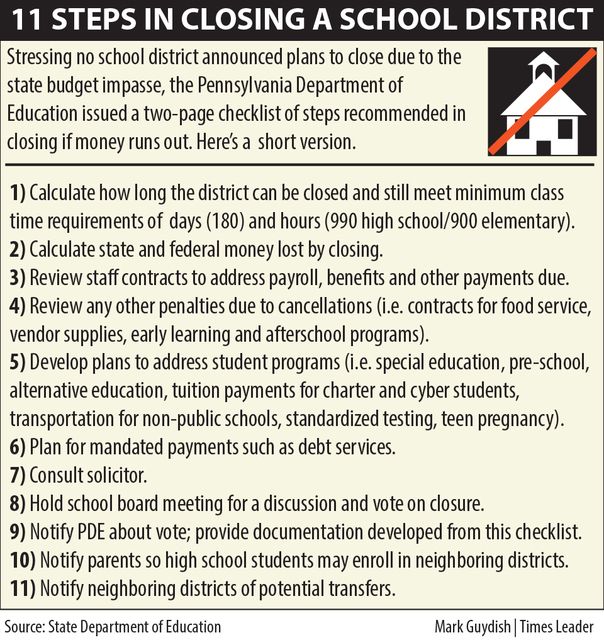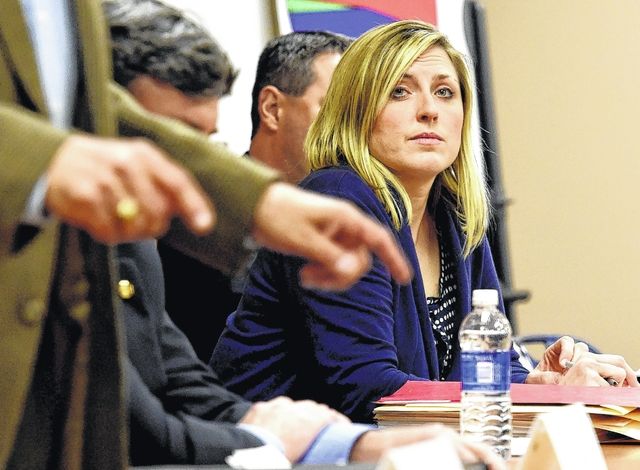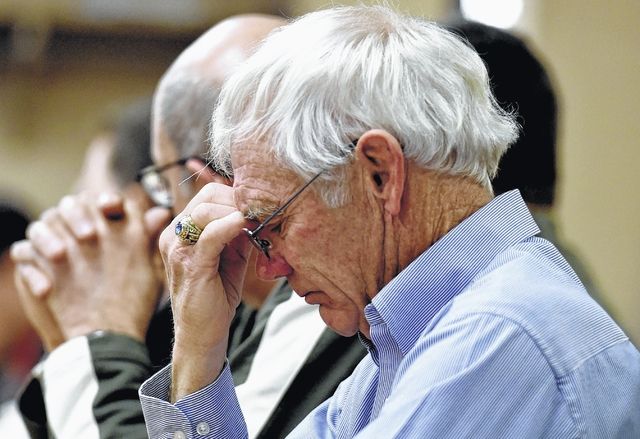Click here to subscribe today or Login.
KINGSTON — During an emotionally-charged exchange that often evoked unguarded passion from area legislators and school district officials, state Rep. Tarah Toohil summed the fear that kept rising to the top: Schools running out of money and closing.
“When the kids are supposed to be graduating and the school is not even functioning for them to graduate, that’s when the pressure will come,” the Butler Township Republican said during a Monday evening roundtable in Kingston regarding the eight-month budget impasse. “That’s when you’ll have the budget you need. But it really is a travesty that it’s going to take the ultimate pressure.”
The Luzerne Intermediate Unit, which provides various services to area schools, hosted the roundtable that drew superintendents, business managers and school board members from area districts, along with Toohil and state Reps. Eddie Day Pashinski, D-Wilkes-Barre, Mike Carroll, D-Avoca, Gerald Mullery, D-Newport Township, and Aaron Kaufer, R-Kingston.
And while wide-ranging comments touched on districts borrowing money, furloughing employees and cutting programs to survive with limited state money — Democratic Gov. Tom Wolf partially passed a Republican budget in December, releasing less than half the expected amount— the elephant in the room remained school closings that, most school officials agreed, could come in March or April.
“There is no reason our taxpayers should have to suffer and pay for what’s going on in Harrisburg. This is insanity,” Wilkes-Barre Area School Board Member John Quinn chafed. Citing his 35 years as a teacher he added “I would shut the district down before we have to borrow more money because they can’t settle things down there.”
“I think we are losing sight of what we are supposed to do. We need to be educating the students.” Wyoming Area Superintendent Janet Serino told the legislators. “My plea to you is to look at what is happening to our young people and ask how can they be and see the future if we can’t give them an education?”
“The take-away today is that all of the districts are out of bullets, there is nothing left at this point,” said Tom Melone of Albert Melone Company, which serves as business manager for several local school districts.
Noting districts have exhausted fund balances, furloughed employees through attrition, and watched bond ratings drop due to the lack of state money, Melone warned “If it’s going to take school districts to close, you are going to see that very soon.”
The fear that school districts will start closing in coming months statewide prompted the state Department of Education to issue a two-page checklist late last week for districts to consider in making such an unprecedented move.
Republican lawmakers have called it a scare tactic, but PDE Spokeswoman Nicole Reigelman said in a written statement that the School Code does not address the issue and the guidelines were compiled and released “after the department received inquiries for assistance from school districts around the commonwealth.”
The guidelines urge districts to look at a wide range of factors, including loss of state and federal funds, how they would make mandated payments like debt service and money owed contractors, and federally-mandated standardized Pennsylvania System of School Assessment (PSSA) tests, among other concerns. The state estimated a full review would take about 60 days.
But Wilkes-Barre Area School District Superintendent Bernard Prevuznak said closing schools, particularly in districts with high percentages of low-income families, had impact far beyond those mentioned in the guidelines.
Noting some Wilkes-Barre Area schools have 80 and even 90 percent low-income students receiving federally subsidized lunches and in some cases after school meals, Prevuznak grew emotional as he warned closing meant more than meeting mandates.
“We shut our schools down, 90 percent of these students aren’t getting fed,” Prevuznak said. “This isn’t PSSA, this is survival.”
Northwest Area School District Operations Manager Betsy Ellis warned that, when it comes to special education students, the state could be facing staggering lawsuits if it fails to help schools fulfill federal mandates.
“That’s where they’ll come after you guys,” she told the legislators. “Every special education lawyer will become so wealthy because of you. And they’ll have federal law on their side.”
Democratic lawmakers put the blame on Republican leadership. Carroll noted the House votes three times on bills like a budget compromise right before Christmas, and that twice it was approved. Yet on Dec. 23, when a third vote was to be held, nothing happened. “The Republican Leadership controls the agenda,” he said.
Kaufer and Toohil didn’t disagree. Toohil suggested things could be different with a more diverse leadership.
“When the leadership meets, there are no African Americans in that room,” she said. “Their are no women in that room. There are lot of people not in that room. You have people in that room digging in their ideologies. And I think people are just digging in more now. I think if some of us could get in that room for a little bit of time we could say, ‘Hey, knock it off’.”
“The conversation happening in Harrisburg is very unhealthy,” Kaufer added, saying he works as the representative to his constituents first, not as a Republican. “We should be talking about changing the system.
“It’s sickening being down there sometimes.”
Northwest Area School Board President Randy Tomasacci played off the “sickening” comment and the complaints that inaction in Harrisburg causes massive problems for local districts.
“When you guys get the flu,” he quipped, “we get pneumonia.”








